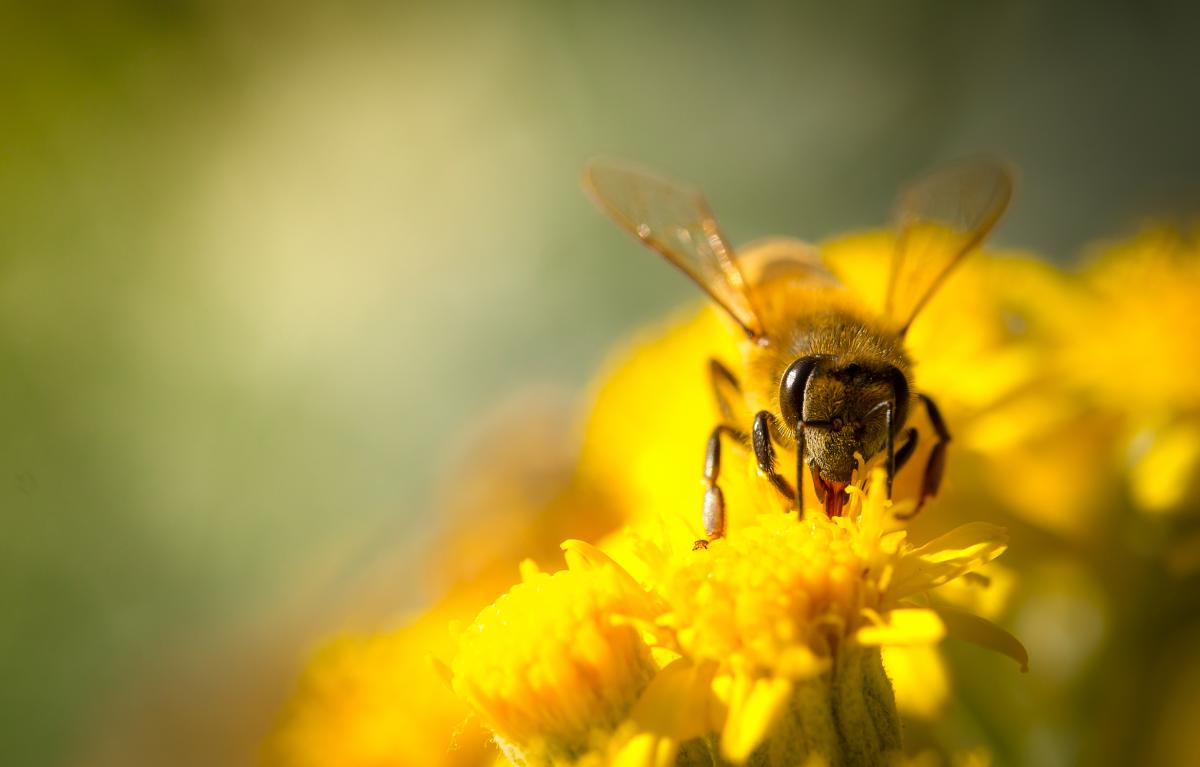Honey is probably the product most frequently mistaken as vegan-friendly. There is a common misconception that honey bees make their honey especially for us, but this couldn’t be much further from the truth.
Honey is made by bees for bees, and their health can be sacrificed when it is harvested by humans. Importantly, harvesting honey does not correlate with The Vegan Society's definition of veganism, which seeks to exclude not just cruelty, but exploitation.
What is honey? 
Honey is the energy source of bees; without it they would starve. Honey also provides essential nutrients during poorer weather and the winter months. The honey bee, the genus of bee used in commercial honey production, will visit up to 1500 flowers in order to collect enough nectar to fill its ‘honey stomach’; a second, separate stomach in which enzymes begin to break down the nectar into honey. After returning to the hive, this is regurgitated and chewed by ‘house bees’ to complete the honey-making process. The hive works as a collective to provide each member with an adequate supply, each bee producing just a twelfth of a teaspoon of honey in its lifetime: significantly less than most people would expect. Honey is fundamental to the hive’s wellbeing.
DID YOU KNOW? There are thousands of species of bees that pollinate many different plants. There are only seven recognised species of honey bee, and they only pollinate specific crops.
Unethical practices
Conventional beekeepers aim to harvest the maximum amount of honey, with high honey yields being viewed as a mark of success. When farmers remove honey from a hive, they replace it with a sugar substitute which is significantly worse for the bees’ health since it lacks the essential micro-nutrients of honey.
In conventional beekeeping, honey bees are specifically bred to increase productivity. This selective breeding narrows the population gene pool and increases susceptibility to disease and large-scale die-offs. Diseases are also caused by importing different species of bees for use in hives.
These diseases are then spread to the thousands of other pollinators we and other animals rely on, disputing the common myth that honey production is good for our environment.
In addition, hives can be culled post-harvest to keep farmer costs down. Queen bees often have their wings clipped by beekeepers to prevent them leaving the hive to produce a new colony elsewhere, which would decrease productivity and lessen profit.
Honey’s popularity shows no sign of slowing. The honey industry, like many other commercial industries, is profit-driven where the welfare of the bees is often secondary to commercial gain.
Environmental effects
Mass breeding of honeybees affects the populations of other competing nectar-foraging insects, including other bees. Overwhelmed by the ever-inflating quantities of farmed bees, the numbers of native bumblebees have declined.
The importing of honey into the UK also increases our carbon footprint through the emissions associated with transport. Of the honey consumed in the UK, 95% of it is imported, mostly from China and Turkey.
Start your vegan journey today by downloading our VeGuide app. You can also join The Vegan Society by completing our quick and simple online form. As a registered charity we rely on our members, and we are so grateful to everyone who supports us. For just £2 a month, your membership will go towards helping us to spread the word of veganism and create a world where animals are free to exist in their own right. In return you’ll receive access to over one hundred vegan discounts, our quarterly magazine, exclusive competitions and more!
Vegan alternatives
Unlike bees, humans can thrive without honey in their diets. Luckily, there are a whole host of readily-available vegan alternatives for those with a sweet tooth. Date syrup, maple syrup, molasses, butterscotch syrup, golden syrup and agave nectar are all viable options, whether you need a product for baking, cooking, as a sweetener for drinks, or to eat a spoon of out of the jar at the end of a long day. We even have a bee-free honey registered with the Vegan Trademark.
If you wish to support bees, please do not buy beeswax or honey, consider donating to a suitable conservation charity instead.

